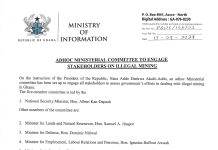
The Director-General of the Ghana Health Service (GHS), Dr. Patrick Kuma-Aboagye has said his outfit has begun a more aggressive phase in its effort to eradicate malaria.
This comes after notable advancements in the epidemic’s management and lessons learnt over time.
At the Minister’s Press Briefing yesterday, the Programme Manager of the National Malaria Elimination Programme, Dr. Keziah Malm stated that the reinforcement of existing interventions that have been successful in reducing malaria over time and the introduction of a few new ones would be necessary to eradicate malaria.
Dr Malm mentioned that the new ones include mass drug administration, post-discharge malaria chemoprevention and scaling up malaria vaccination, as well intermittent preventive treatment of malaria in school children.
She added that under the defunct Malaria Control Programme, the country had been able to reduce prevalence and mortalities significantly, justifying the country’s potential to eliminate malaria.
‘’The current elimination target is focused on reducing mortality by 100 per cent by 2028 and cases by 50 per cent using the 2022 figures as the baseline’’, the Programme Manager said.
She further stated that Malaria deaths have reduced significantly over the last years from 1.42 out of every 100,000 cases to 0.45 per 100,000.
On strategy, Dr Malm said that the new malaria elimination strategic plan had been developed to strengthen passive and active surveillance and monitoring evaluation systems; ensure that 100 per cent of all confirmed cases were appropriately, effectively and completely treated within 72 hours and ensure 100 per cent by 2028.
Malaria, a major cause of death’s prevalence had reduced from 27.5 per cent in 2011 to 8.6 per cent in 2022, while mortality had reduced by 95 per cent between 2012 and 2022, representing a decline from 2,799 deaths in 2012 to 151 in 2022.
Source: MOI (PR Unit)
























